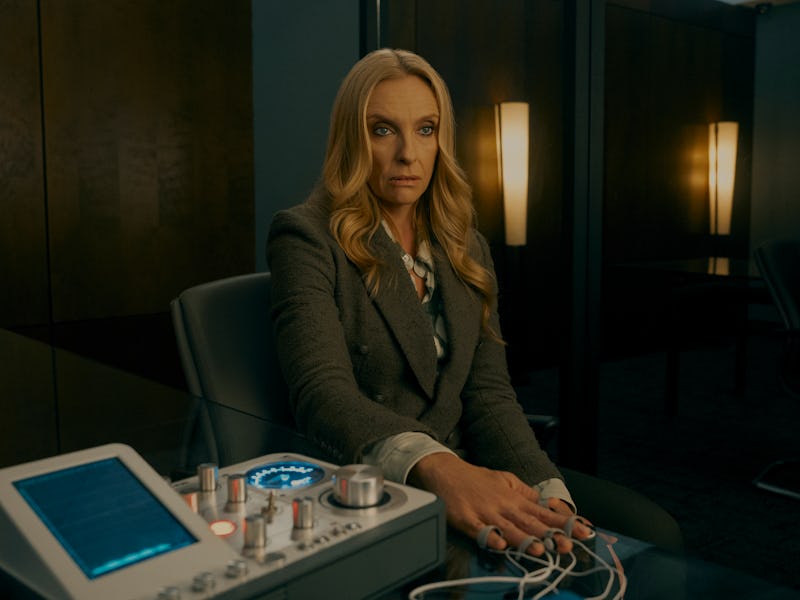The Power is The Boys But for Girls — With One Big Problem
Toni Collette stars in a series with interesting worldbuilding but all the nuance of a sledgehammer.

The Power, Prime Video’s female-focused superhero show, is adapted from Naomi Alderman’s book of the same name, a book that was heavily influenced by the author’s mentor, Margaret Atwood. That’s clear from the start — the slightly-skewed, “what if” premise feels like it is trying to be The Handmaid’s Tale for the next generation. But much like the Hulu adaptation of The Handmaid’s Tale, The Power makes for an interesting thought experiment, before it quickly becomes not only obvious, but preachy.
The Power follows a group of women as they develop a strange, unexplained, but transferable power to generate electricity thanks to a new organ found in the collarbone. It quickly gets a name — EOD — and a stigma.
While firmly an ensemble series, Toni Collette shines as Margot Cleary-Lopez, a mayor and mother of Jos (Auli’i Cravalho), a teen girl who exhibits the power and can’t seem to control it. Across the world, girls are developing this power. At first, it’s seen as a hoax, but after a rogue discharge causes a tragedy, Margot admits the power is real and becomes the face of EOD advocacy, even when that puts her at odds with the governor (Josh Charles) and her own husband (John Leguizamo.)
Jos tries to control her EOD powers.
Margot and Jos’ story is told in parallel with a number of other stories from around the globe. In London, Roxy (Ria Zmitrowicz) tries to win the respect of her father, who may be involved in shady business. In Nigeria, Tunde (Toheeb Jimoh) documents different cases of EOD that quickly turns into protest coverage. Back in the states, Allie (Halle Bush) starts to hear voices and runs from her abusive home to find shelter with a group of rebel nuns.
When Margot tells the world about EOD, she prefaces it with a long monologue about what happens when women aren’t told what’s going on with their bodies, comparing ignoring EOD with back-alley abortions, forced birth, rape culture, and maternal health. The series’ main conceit is spelled out: The world is changing, and it’s because women finally have a way to fight back.
At first blush, it sounds outdated, like rhetoric ripped from the 2017 Women’s March. But the show, for its credit, does take time to examine the intersectional aspects of the issue. Allie makes friends with a transgender nun, establishing that “woman” is not simply defined by body part, be that a uterus or a weird electronic new organ. Tunde, the sole male main character, examines how his privilege affects his sudden fame in documenting the power.
Sister Maria (Daniela Vega) does give the gender politics of the series some nuance.
But at its heart, The Power can’t help but go down the path of hackneyed gender politics. Jos gives a speech about how she can walk home alone at night now, but then Roxy accosts a club bouncer with a “give us a smile.” When women are forced into power, it’s easy to slip into stereotypical moments.
The Power garners comparisons to its more gory, less teen-focused Prime Video sibling The Boys, but the shows do have some key differences. Both give a lot of screentime to the concept of legislating around superpowers and both have a heavy dose of political satire, but The Power goes one step further and plays this completely straight. When the governor warns Margot to keep her cool around EOD by saying “Remember Covid?” it’s a harsh reminder that this isn’t an alternate present, it’s a ghostly apparition of a hypothetical future where good and evil are clear and revenge fantasies are default.
Really, the show is more like an eight-hour-long episode of Black Mirror, proudly pointing out sexism with a narrative full of double standards. It’s great for teen girls who may need a show to be Baby’s First Feminist Narrative, but much like the main problem with The Handmaid’s Tale, your average adult woman doesn’t need a hypothetical to see how messed up the world is: she could just look out the window.
While it is satisfying to see how the power dynamics shift in a now-matriarchal society, it’s more interestingly explored in other shows like the currently-airing Yellowjackets. The Power is the television equivalent of a pussy hat: well-intentioned, but a bit on-the-nose and outdated.